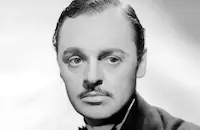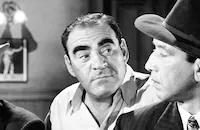Street of Chance
Cast & Crew
Jack Hively
Burgess Meredith
Claire Trevor
Louise Platt
Sheldon Leonard
Frieda Inescort
Film Details
Technical Specs

Synopsis
One afternoon, Frank Thompson is knocked unconscious by wreckage falling from a building on Tillary Street in New York City. When he revives, Frank is seriously disoriented although unharmed. Frank soon discovers that his apartment has been rented out for a year and his wife Virginia has been living on her own elsewhere. Frank confronts Virginia, who is shocked to see the husband who disappeared without explanation a year earlier. Virginia is thrilled to reunite with Frank, who has no memory of the past year, and he returns to his regular life. Soon, however, he is haunted by the appearance of Joe Marucci, a threatening looking police detective who follows Frank everywhere, and eventually breaks down the door to the apartment to arrest him. Frank and Virginia escape on the rooftops and he sends her home to her mother until he can clear up the mystery behind his missing year. By returning to Tillary Street, Frank hopes to jog his memory and is startled when Ruth Dillon, a beautiful blonde, hurries him into her apartment for his own protection. Ruth identifies Frank as her lover, known as Danny Nearing, with whom she worked as a servant at the Diedrich estate in Jericho County until Frank was accused of Harry Diedrich's murder. Convinced that he is innocent, Frank insists that Ruth accompany him as he searches the Diedrich estate for evidence. Ruth reluctantly accompanies him as he probes around the dark house. There Frank discovers that Grandma Diedrich, an elderly, mute invalid, witnessed the murder but was not consulted by the police. Harry's wife Alma and her lover, his brother Bill, return from an interrogation by the district attorney and are surprised to find Ruth in the house on her day off. Frank hides in the greenhouse while Ruth cuts the phone wires so that the suspicious Diedrichs cannot call the police. The next night the Diedrichs go out and, unknown to Ruth and Frank, Joe watches their activities. Frank gets a few moments alone with Grandma and communicates with her through a code they have worked out with eyeblinks. Frank is shocked to learn from Grandma that Ruth is the real killer. When pressed, Ruth admits that she unintentionally stabbed Harry when he found her stealing money. Despite Ruth's pleas, Frank is unable to sympathize with her because she selfishly let him suffer the burden of the murder accusation in order to save herself. Ruth tries to kill Frank, and as they struggle for the gun, a shot is fired into Ruth. Joe comes into the house after the shot is fired and hears Ruth confess to the murder before she dies.

Director
Jack Hively
Cast

Burgess Meredith

Claire Trevor
Louise Platt

Sheldon Leonard

Frieda Inescort

Jerome Cowan
Adeline Dewalt Reynolds
Arthur Loft
Clancy Cooper
Paul Phillips
Keith Richards

Ann Doran
Cliff Clark
Edwin Maxwell
Gladden James
Reed Porter
Kenneth Chryst
Kernan Cripps
Sonny Boy Williams
Helen Mackellar
Ruth Gillette
Harry Tyler
Besse Wade

Ralph Dunn
James C. Morton
Milton Kibbee
George Watts
Gloria Williams
Crew
David Buttolph
Haldane Douglas
Hans Dreier
Garrett Fort
Alvin Ganzer
Burt Kelly
Harold Lewis
Philip Macdonald
Richard Olson
Arthur Schmidt
Sol C. Siegel
Theodor Sparkuhl

Film Details
Technical Specs

Articles
Louise Platt, 1915-2003
She was born on August 3, 1915 in Stanford, Connecticut. Her father was a Navy doctor who relocated to Annapolis, Maryland when she was a toddler. An early interest in school dramatics eventually led her to theater as a profession, and she made her Broadway debut in 1936 in a Philip Barry play, Spring Dance.
Platt made the move to Hollywood two years later, and although her film career was short (1938-1942), her keen intelligence in a variety of parts left a very pleasant impression on the silver screen. She was an effective romantic lead opposite Henry Fonda in Henry Hathaway's Spawn of the North (1938); held her own in a star-studded cast that included John Wayne, Thomas Mitchell and Claire Trevor, in John Ford's brilliant Stagecoach (1939); displayed a deft comic touch alongside Melvyn Douglas in Leslie Fenton's minor mystery gem Tell No Tales (1939); led a battleship into war (really) in Richard Wallace's cultish adventure yarn Captain Caution (1940); and showed some striking allure as a femme fatale in Jack Hively's noirish thriller Street of Chance (1942).
Despite her uniformly excellent performances in these films, Platt returned to Broadway, where her star shone brightly in the '40s when she landed the leads in such plays as Johnny Belinda and Anne of a Thousand Days. Platt would make some guest appearances on a few television shows in the '50s, including Alfred Hitchcock Presents, The Naked City, and a regular role in the popular soap opera The Guiding Light, before returning to the stage for the remainder of her career. She is survived by two daughters and several grandchildren.
by Michael T. Toole

Louise Platt, 1915-2003
Quotes
Trivia
Notes
The working title of this film was The Black Curtain. William Clemens was originally slated to direct, but because of illness was replaced by Jack Hively. According to a Daily Variety news item, Hively entered the Armed Forces upon completion of this film. He did not direct again until 1948. According to a Hollywood Reporter news item, Henry Kraft, formerly Ray Milland's stand-in on Reap the Wild Wind, was cast in this film, but his appearance in the final film has not been confirmed. The film is unrelated to Paramount's 1930 film of the same name (see AFI Catalog of Feature Films, 1921-30; F2.5437).














